6 start with H start with H
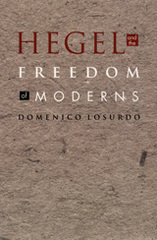
Hegel and the Freedom of Moderns persuasively argues that the tug of war between “conservative” and “liberal” interpretations of Hegel has obscured and distorted the most important aspects of his political thought. Losurdo unravels this misleading dualism and provides an illuminating discussion of the relation between Hegel’s political philosophy and the thinking of Karl Marx and Friedrich Engels. He also discusses Hegel’s ideas in relation to the pertinent writings of other major figures of modern political philosophy such as Jean-Jacques Rousseau, John Locke, Edmund Burke, John Stuart Mill, Jeremy Bentham, Karl Popper, Norberto Bobbio, and Friedrich Hayek.
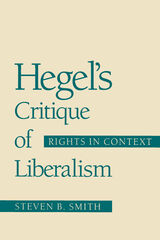
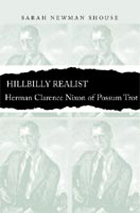
Nixon’s life offers insight into one southerner’s efforts to comprehend and interpret the conflict and change of his time and illuminates for contemporary Americans a classical view of life—one lived fully, right in strength, beauty, courage, compassion, adventure, and thought.
Clarence Nixon was first and foremost a Southern intellectual, deeply involved in the region’s cultural renaissance, and his life reveals an intellectual odyssey from Victorianism to Modernism. As his personality, ideology, and social environment interacted, a new world view emerged. But he was an ambivalent modernist, like many intellectuals who were reared in the nineteenth-century South, he never abandoned certain Victorian ideals and values.
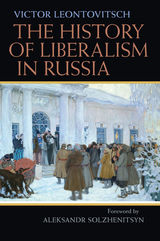
Foreword by Aleksandr Solzhenitsyn
The influence of liberalism in tsarist Russia is deeply problematic to most historians. In this highly original study, Victor Leontovitsch offers a reinterpretation of liberalism in a uniquely Russian form. He documents the struggles to develop civil society and individual liberties in imperial Russia up until their ultimate demise in the face of war, revolution, and the collapse of the old regime.
From Catherine the Great’s proposal of freedom for serfs born after a predetermined year, through the creation of zemstvos by Alexander II, and the emergence of the State Duma and a quasi-constitutional monarchy under Nicholas II, Leontovitsch chronicles the ebb and flow of liberal thought and action in the difficult circumstances of tsarist Russia. He cites numerous examples of debates over civil rights, property laws, emancipation, local jurisdiction, political rights, and constitutional proposals. Focusing on liberal reforms and reformers within the governing elite, Leontovitsch draws important distinctions between factions of radical (but fundamentally illiberal) progressives and true (but often concealed) liberalism.
This is the first English-language translation of Leontovitsch’s monumental work, which was originally published to critical acclaim in German in 1957. Aleksandr Solzhenitsyn sponsored a Russian edition in 1980, and his introduction is translated for the foreword of this edition. With a wide readership in today’s Russia, The History of Liberalism in Russia continues to resonate as a penetrating analysis of the historical precedents of liberal thought and its potential as a counterweight to current autocratic tendencies and the uncertainties of Russia’s political future.
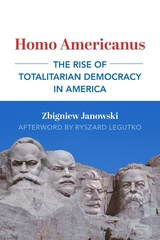
“Only someone shortsighted, or someone who values equality more than freedom, would deny that today’s citizens enjoy little or no freedom, particularly freedom of speech, and even less the ability to express openly or publicly the opinions that are not in conformity with what the majority considers acceptable at a given moment. It may sound paradoxical to contemporary ears, but a fight against totalitarianism must also mean a fight against the expansion of democracy.”
Janowski all at once brazen and out of bounds states what he calls the obvious and unthinkable truth: In the United States, we are already living in a totalitarian reality. The American citizen, the Homo Americanus, is an ideological being who is no longer good or bad, reasonable or irrational, proper or improper except when measured against the objectives of the dominating egalitarian mentality that American democracy has successfully incubated. American democracy has done what other despotic regimes have likewise achieved––namely, taken hold of the individual and forced him to renounce (or forget) his greatness, pursuit of virtue and his orientation toward history and Tradition.
Homo Americanus, Janowski argues, has no mind or soul and he cannot tolerate diversity and indeed he now censors himself. Democracy is not benign, and we should fear its principles come by and applied ad hoc. It is deeply troublesome that in the way democracy moves today it gives critics no real insight into any trajectory of reason behind its motion, which is erratic and unmappable. The Homo Americanus is an ideological entity whose thought and even morality are forbidden from universal abstraction.
Janowski mounts the offensive against what the American holds most sacred, and he does so in order to save him. After exposing the danger and the damage done, Janowski makes another startling proposal. It is a “diseased collective mind” that is the source of this ideology, the liberal anti-perspective that presses man into the image of the Homo Americanus, and its grip can only be broken through the recovery of instinct. Homo Americanus cannot be free again until he is himself again. That is, until the shadow that belongs only to him is restored, and he is thereby no longer alienated from others. Despite the condemnation Janowski seems to be levying on the citizen of the United States, he betrays a great hope and confidence that the means to shake ourselves awake from the bad dream are nevertheless in hand.
Janowski’s work is the next title in St. Augustine’s Press Dissident American Thought Today Series. It occupies a controversial overlapping terrain between the philosophical descriptions of liberalism as a tradition, psychology and the fundamentally influential critiques of democracy offered by Thucydides, Jefferson, Franklin, Tocqueville, Mill, Burke and more. More anecdotal than analytical, Janowski offers the contemporary proof that the reader is right to be scandalized by democracy and his or her own likeness of the Homo Americanus. Once upon a time it was the despicable Homo Sovieticus fruit of tyranny, but now we fear democratic society too might fall and all its citizens never be found again.

READERS
Browse our collection.
PUBLISHERS
See BiblioVault's publisher services.
STUDENT SERVICES
Files for college accessibility offices.
UChicago Accessibility Resources
home | accessibility | search | about | contact us
BiblioVault ® 2001 - 2024
The University of Chicago Press









